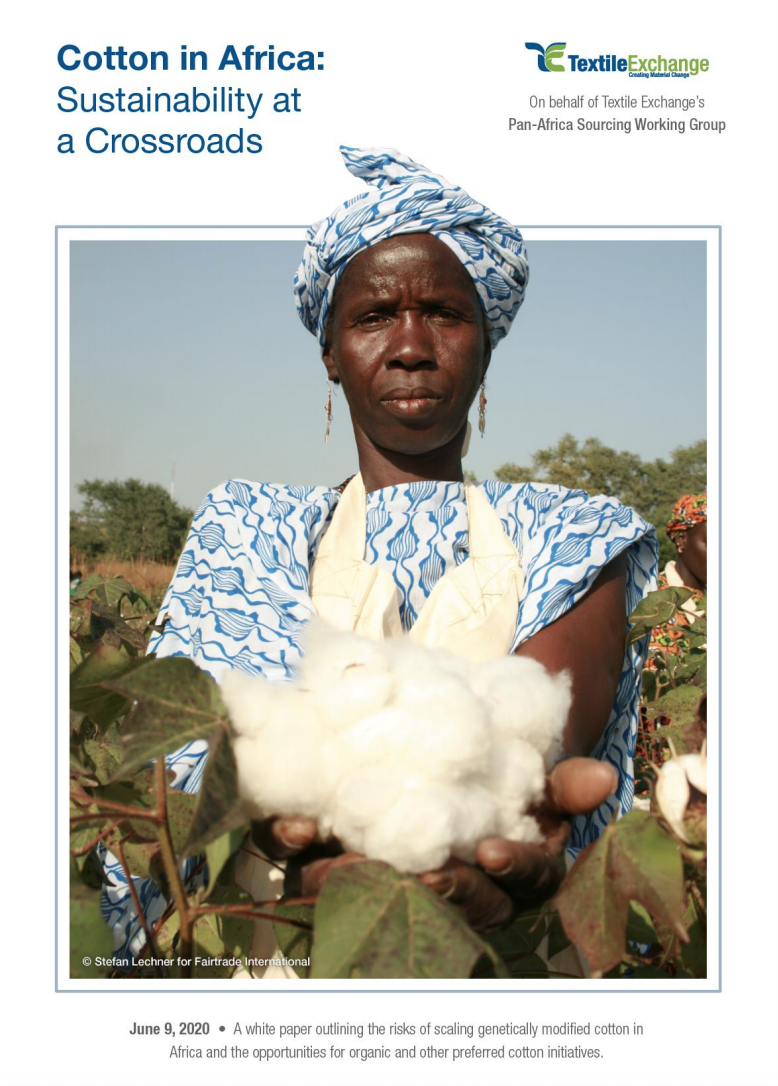Report shows opportunities for organic and other GM-prohibiting production of cotton in Africa
 Genetic modification is prohibited in organic production and a recent report "Cotton in Africa: Sustainability at a Crossroads," has been released by the Textile Exchange Pan-Africa Sourcing Working Group, addressing concerns over recently expanded genetically modified (GM) cotton production in Africa. The report outlines the status of GM cotton, which has been adopted by seven countries in Africa, and makes a case for organic and other preferred production methods that prohibit the technology. Consumer and industry demand for organic cotton is increasing and the working group urges policymakers to help increase non-GM cotton production in Africa to help meet the rising demand and highlights the socioeconomic and environmental concerns about GM crops. While the use of genetically modified crops has induced public concern about health and environmental risks, the authors suggest that uncertainty in financial benefit is the greatest risk to farmers, particularly for those who are cash-poor. GM systems require a lot of up-front capital to invest in the seed and other inputs, so if crops fail, a farmer may not have ability to get started again the following year. While there is evidence that GM crops can be successful financially, there is also significant risk of “debt, bankruptcy, and even farmer suicides if returns do not pay off, especially for smallholder farmers in countries that do not provide economic safety nets.” According to the report, organic cotton and other non-GM production methods provide a more financially secure opportunity that limits the risk of adverse health and environmental effects of farming compared to GM production. Currently four countries in Africa have rejected GM technology, but several other countries are currently considering adoption. The working group urges countries that decide to adopt GM cotton to also impose strong biosafety regulations and simultaneous investment in non-GM seed and training for non-GM production methods.
Genetic modification is prohibited in organic production and a recent report "Cotton in Africa: Sustainability at a Crossroads," has been released by the Textile Exchange Pan-Africa Sourcing Working Group, addressing concerns over recently expanded genetically modified (GM) cotton production in Africa. The report outlines the status of GM cotton, which has been adopted by seven countries in Africa, and makes a case for organic and other preferred production methods that prohibit the technology. Consumer and industry demand for organic cotton is increasing and the working group urges policymakers to help increase non-GM cotton production in Africa to help meet the rising demand and highlights the socioeconomic and environmental concerns about GM crops. While the use of genetically modified crops has induced public concern about health and environmental risks, the authors suggest that uncertainty in financial benefit is the greatest risk to farmers, particularly for those who are cash-poor. GM systems require a lot of up-front capital to invest in the seed and other inputs, so if crops fail, a farmer may not have ability to get started again the following year. While there is evidence that GM crops can be successful financially, there is also significant risk of “debt, bankruptcy, and even farmer suicides if returns do not pay off, especially for smallholder farmers in countries that do not provide economic safety nets.” According to the report, organic cotton and other non-GM production methods provide a more financially secure opportunity that limits the risk of adverse health and environmental effects of farming compared to GM production. Currently four countries in Africa have rejected GM technology, but several other countries are currently considering adoption. The working group urges countries that decide to adopt GM cotton to also impose strong biosafety regulations and simultaneous investment in non-GM seed and training for non-GM production methods.

